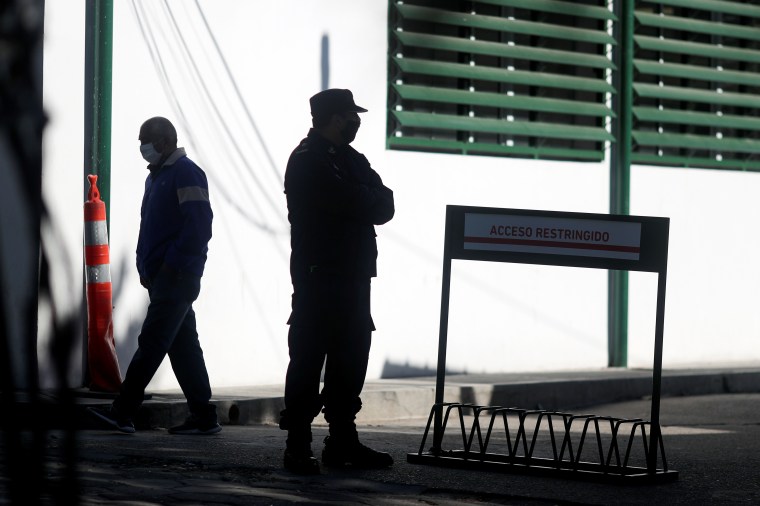Since April 2020, authorities in Argentina’s northeastern Formosa province have harassed journalists covering the regional government’s response to the COVID-19 pandemic, including through intimidation, brief detentions, and smear campaigns, according to journalists who spoke to CPJ, a statement by the Forum of Argentinian Journalism (FOPEA), a local free expression organization, and news reports.
On April 21, 2020, the Formosa COVID-19 Emergency Comprehensive Care Council, a government body chaired by the governor, Gildo Insfrán, imposed strict entry requirements into the province, requiring journalists to obtain a special pass and spend at least two weeks in one of the province’s quarantine centers even if they had tested negative for the coronavirus, according to press reports.
Journalists, who are classified as essential workers, were allowed to freely enter and leave other provinces, according to those sources. In July 2020, President Alberto Fernández issued a decree exempting staff working for “communications services” from social distancing and quarantine restrictions as long as they possess a circulation certificate issued by the federal government.
The Formosa province restrictions remained in place despite that decree, and became widely known when reporter Inés Beato Vassolo published a February 7, 2021, report in national newspaper La Nación on the restrictions, entitled, “It is forbidden to report from Formosa, where laws do not apply.” In that report, she wrote that she was barred from entering Formosa because she did not have a special permit required by the province.
Following the publication of that report, a group of journalists from national media outlets filed a complaint before a federal court in Formosa, demanding that they be allowed to enter the province; on February 20, Formosa State Prosecutor Stella Maris Zabala announced that journalists would be allowed to enter without the need to quarantine as long as they could show negative coronavirus test results, according to media reports.
During the months when journalists outside the province were largely barred from entry, provincial authorities harassed the local press, according to journalists who spoke to CPJ.
On June 19, 2020, police officers in the Formosan town of Pirané intercepted Javier Orlando Pineda, a reporter for the provincial TV station Canal 2, while he was driving to his home, and detained him, according to Pineda, who spoke to CPJ via messaging app.
The officers handcuffed Pineda, confiscated his phone, and took him to the city police station, where they held him for about four hours and then returned his phone and released him without charge, he said. Pineda told CPJ the officers never presented a warrant for his arrest or stated why he was being detained.
Pineda said that, three days earlier, he had reported on a woman who was hospitalized with coronavirus symptoms in the area, and said he believed he was being harassed for that reporting.
The provincial government also imposed strict rules on the COVID-19 press conferences held by officials, where they required questions to be delivered in writing beforehand and lashed out at journalists who asked critical questions, according to FOPEA, the Association of Argentine Press Companies (ADEPA), a professional association, and Max Berenfeld, owner and director of the news website Cuarto Poder Diario, who spoke to CPJ via messaging app.
“We are mistreated by authorities, badly mistreated, if we ask questions they do not like,” Berenfeld told CPJ. “And so, the government started a campaign of persecution against the press. Initially it was mostly verbal attacks, accusing us of being anti-homeland, saying that we were part of the opposition, insulting us; anything in order to avoid having to respond to the situation that the press was denouncing.”
On December 19, 2020, during a COVID-19 Emergency Comprehensive Care Council press conference, Leonardo Fernández Acosta, a reporter with the local newspaper El Comercial, asked a question about the case of a woman who had been denied entry to the province to attend to her ill mother. The council spokesperson, Minister Jorge González, responded by calling him “a liar,” “low,” and “mean,” accusing him of taking things out of context, making things up, and accused him of being part of an “operation” to attack the government, according to news reports.
“They repudiated me live on the official government broadcast and then, as normally happens, in government outlets, social networks, with trolls . . . to try to destroy you, to pulverize your credibility, using threats, in short, the usual,” Fernández told El Comercial. According to ADEPA and a statement by FOPEA, Fernández was targeted for online harassment by anonymous accounts over his questioning of the government’s COVID-19 policies.
Berenfeld told CPJ that the Insfrán administration was “denying the entry of journalists, because the authorities know that journalists want to enter Formosa to report on the abuses happening here with their COVID sanitary policies.”
Insfrán has been in office since 1995, and is a member of the Frente de Todos political alliance with President Alberto Fernández, according to press reports. In January, in response to requests by the opposition and human rights organizations for federal intervention in Formosa, President Fernandez said he supported Governor Insfrán and declined to intervene, according to press reports.
CPJ emailed the government of Formosa, Governor Insfrán’s office, and the Formosa police for comment, but did not receive any replies.
